Set the Foundation for Ethical Practice in ABA
Applied Behavior Analysis (ABA) is a widely utilized, evidence-based intervention for individuals with autism spectrum disorder (ASD) and other developmental disabilities. However, its application raises crucial ethical questions about how practitioners uphold core moral principles, ensure client rights, and adapt to societal developments. This article explores the ethical frameworks, standards, controversies, and future directions shaping the responsible practice of ABA, emphasizing the importance of ongoing ethical reflection and cultural competence.
The Central Role of Ethical Fundamentals in ABA Practice
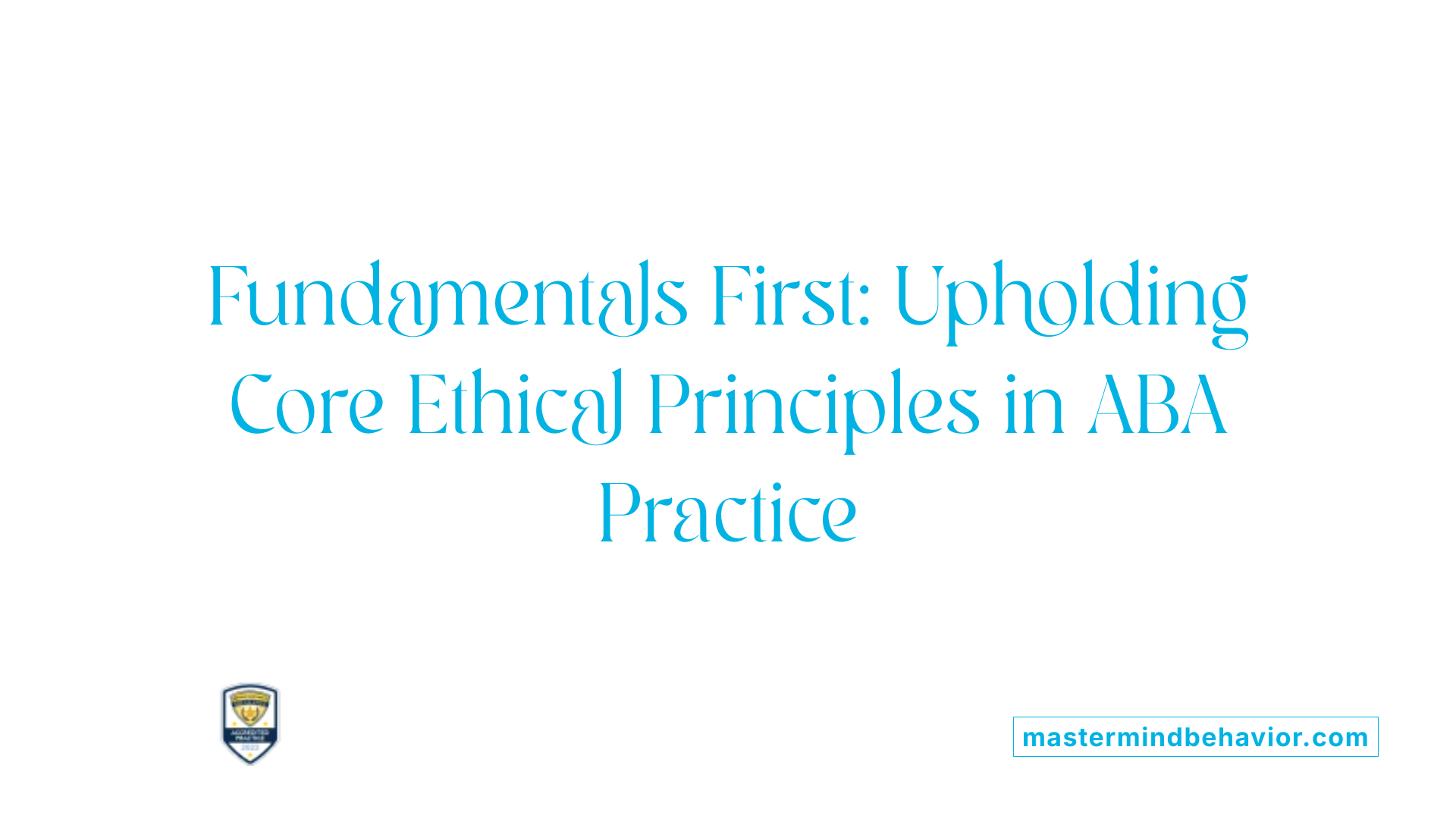
What is ethics in a behavioral context?
Ethics in a behavioral context involves applying moral principles to guide responsible practice by behavior analysts. This includes emphasizing beneficence — doing good for clients, and non-maleficence — avoiding harm. Respect for clients’ dignity and autonomy is central, ensuring their rights are protected throughout treatment.
Behavior analysts are expected to adhere to established guidelines from professional organizations like the BACB, which set clear standards for ethical conduct. Practicing ethically also requires ongoing self-assessment, transparency with clients and colleagues, and accountability for one’s actions. These standards collectively aim to safeguard client rights, promote humane and effective interventions, and uphold public trust in ABA services.
What are the core ethical principles and values in ABA therapy?
The fundamental values guiding ABA practice include beneficence, non-maleficence, autonomy, justice, dignity, and professional integrity. These principles ensure that practitioners prioritize clients’ well-being while respecting their individual rights and cultural backgrounds.
For instance, beneficence drives behavior analysts to implement interventions that improve clients’ quality of life. Autonomy emphasizes respecting clients' choices and their right to informed consent. Justice ensures fairness and access to care, especially for marginalized groups. Dignity underscores treating each person with respect, and professional integrity requires honesty, transparency, and adherence to ethical standards.
These core values are reinforced through the BACB's ethics code, guiding behavior analysts in day-to-day decisions, such as maintaining client confidentiality, avoiding conflicts of interest, and seeking ongoing professional development. By integrating these principles into practice, ABA professionals can maintain high standards of care that are both effective and ethically sound.
Aligning Evidence-Based Practice (EBP) with Ethical Standards
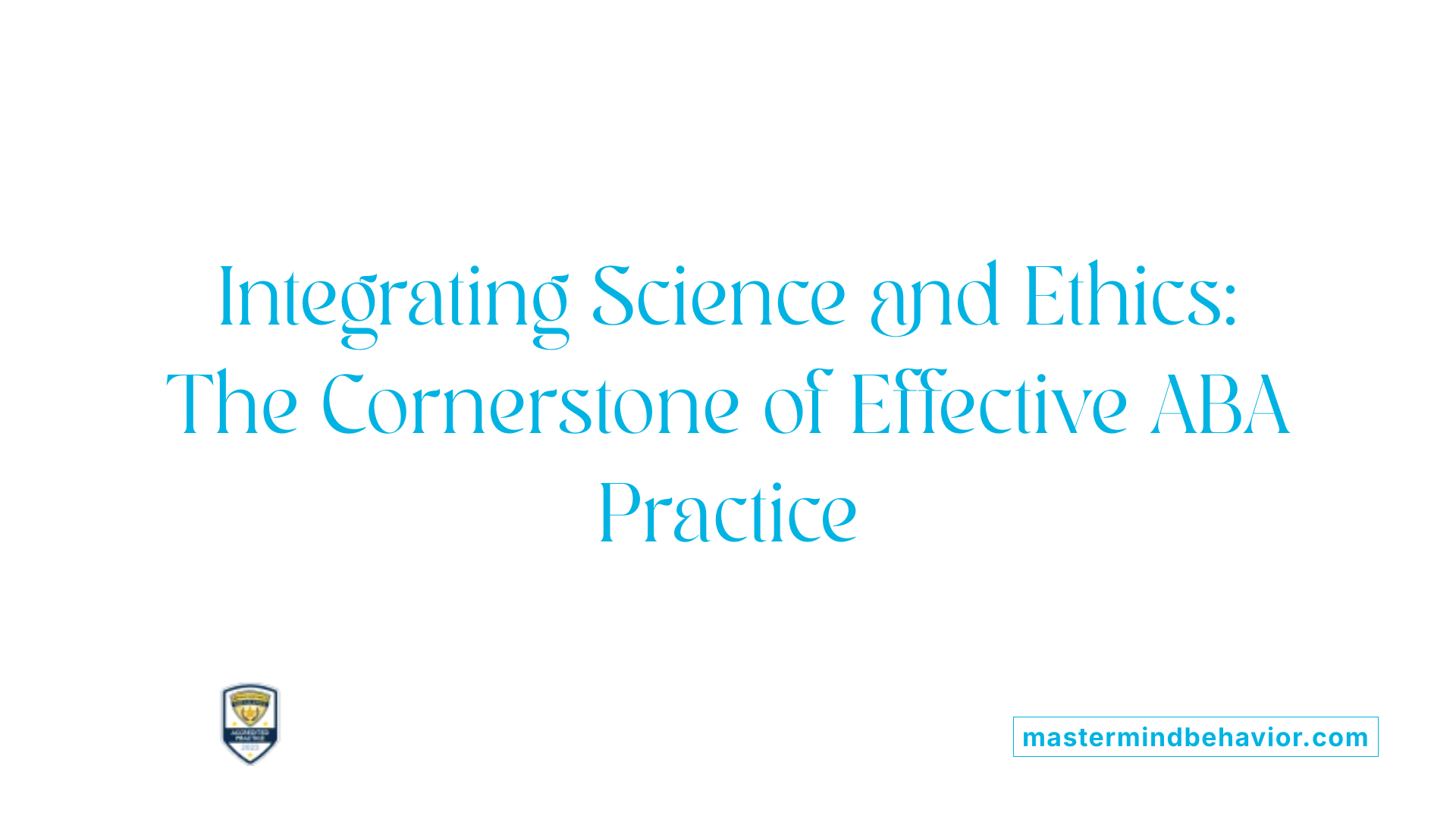
What are the components of EBP: best available evidence, client values and context, and clinical expertise?
The EBP framework in ABA integrates three essential elements. The first is the use of the best available evidence, which involves systematic review and critical assessment of peer-reviewed research and data to inform treatment decisions.
Second, it emphasizes understanding and prioritizing client values and their unique context. This encourages practitioners to consider the preferences, cultural background, and social circumstances of clients and their families.
The third component involves clinical expertise and professional judgment. Behavior analysts rely on their training and experience to interpret evidence, apply it appropriately, and adapt interventions to suit individual needs.
Bringing these components together ensures that interventions are scientifically supported, ethically sound, and tailored to promote client well-being.
How does EBP support ethical decision-making in ABA?
EBP serves as a foundation for ethical practice by providing a transparent, systematic approach to selecting interventions and evaluating their effectiveness.
Practitioners formulate search questions and assess relevant evidence responsibly, aligning their practices with current scientific standards. This process helps avoid harm by basing treatments on verified data and proven outcomes.
Regular progress monitoring and ongoing evaluation are integral to both EBP and ethical standards, ensuring that interventions remain effective and ethically appropriate. This adaptive approach respects client autonomy, encourages transparency, and fosters trust.
By blending evidence with an understanding of client values and clinical expertise, ABA professionals uphold principles like beneficence, justice, and respect, making decisions that protect and promote clients’ rights and dignity.
| EBP Elements | Description | Ethical Significance |
|---|---|---|
| Best Available Evidence | Scientific data and peer-reviewed research | Ensures interventions are effective and safe |
| Client Values & Context | Personal preferences, cultural background | Respects autonomy and cultural responsiveness |
| Clinical Expertise | Practitioner’s judgment and experience | Promotes competent, tailored care |
This integration underscores the importance of ethical adherence in every stage of ABA practice, from assessment to intervention and follow-up.
Frameworks for Ethical Decision-Making in ABA
What are the ethical decision-making frameworks used in ABA?
In Applied Behavior Analysis (ABA), practitioners rely on structured models grounded in fundamental ethical principles to guide their decisions. These frameworks ensure that actions prioritize the well-being and rights of clients while maintaining professional integrity.
A common approach involves a step-by-step process that starts with identifying the ethical dilemma or conflict. Practitioners then consult relevant professional guidelines such as the BACB Ethics Code, which emphasizes principles like beneficence (benefiting others), non-maleficence (do no harm), autonomy (respect for client independence), and justice (fairness). This initial assessment helps clarify the core issues involved.
Next, behavioral practitioners evaluate possible actions, considering how each option aligns with their ethical commitments. They analyze potential outcomes, weighing benefits against risks, and consider the impact on all stakeholders—including clients, families, and the broader community.
Several ethical paradigms influence these decision-making processes. Deontology focuses on duty and adherence to established rules, while utilitarianism emphasizes maximizing positive outcomes for the greatest number. Virtue ethics encourages practitioners to embody moral character and integrity, whereas care ethics highlights relationships and empathy.
Evaluating choices also involves recognizing common dilemmas, such as balancing respecting client autonomy with the need to provide beneficent care. Cultural and contextual factors are vital; incorporating diverse perspectives, including Indigenous viewpoints, ensures culturally responsive and respectful practices.
Ultimately, these models support ABA professionals in making well-reasoned, ethical decisions that honor client rights and promote the highest quality of care.
Controversies and Criticisms Surrounding ABA
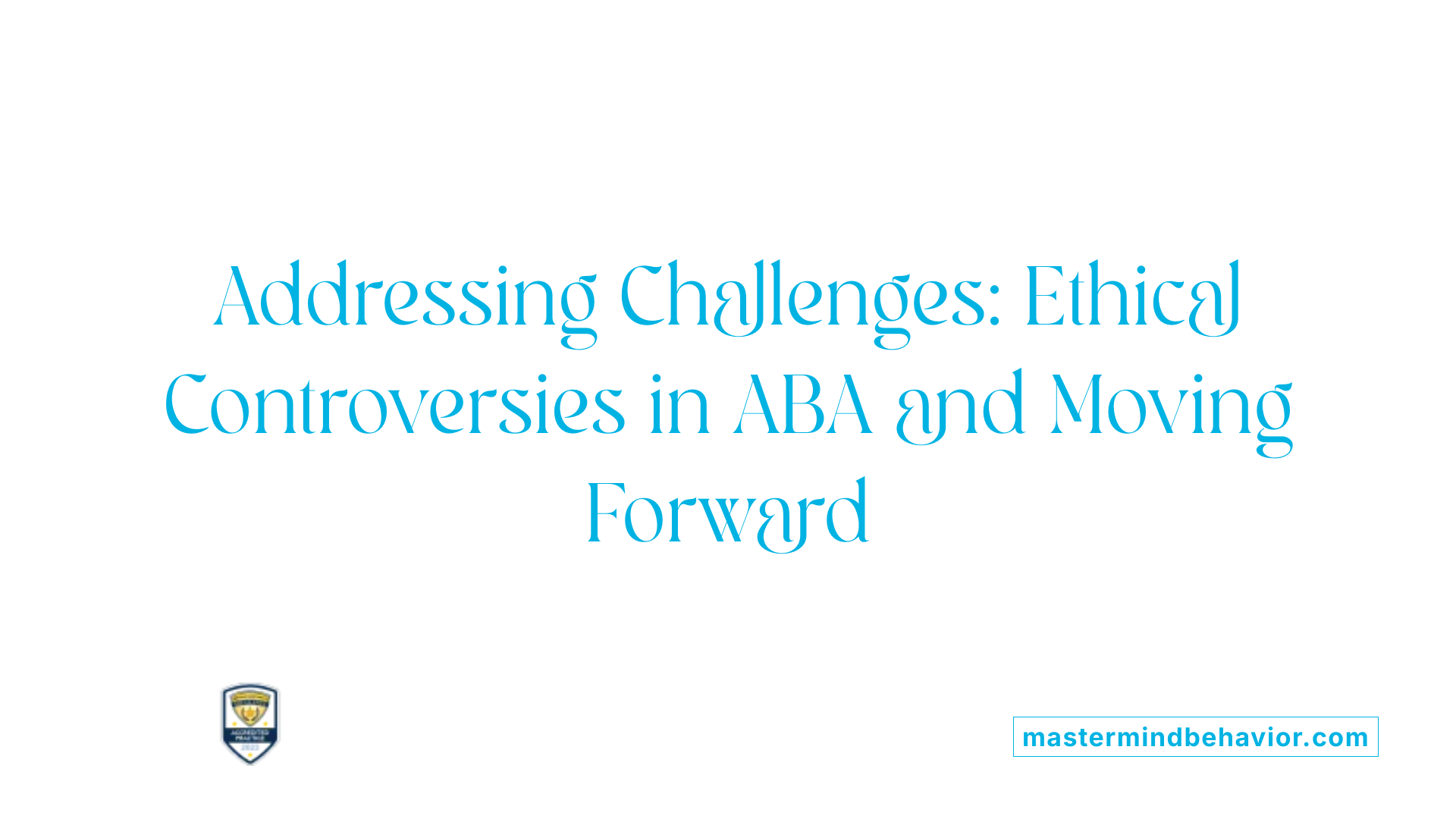
What are the main ethical issues and controversies in ABA?
Applied Behavior Analysis (ABA) has been vital in providing evidence-based interventions, especially for individuals with Autism Spectrum Disorder (ASD). However, it has also attracted significant ethical debates.
One of the primary concerns stems from its historical reliance on aversive and coercive techniques. Critics argue these methods can violate principles of nonmaleficence—doing no harm—and undermine informed consent by not always fully respecting client autonomy.
Many express worry that ABA sometimes emphasizes compliance and normalization over the emotional well-being and individual identity of autistic children. When therapy focuses heavily on behavior modification that aims to make autistic individuals conform to neurotypical standards, it risks diminishing the recognition of neurodiversity and personal differences.
This approach may lead to emotional harm or distress, raising ethical questions about respecting the dignity and inherent worth of each person. The debate also touches on systemic issues such as how resources are allocated, the fidelity of treatment implementation, and whether aggressive or non-consensual practices infringe upon clients' rights.
While the positive effects of ABA are well-documented, critics advocate for more personalized, ethically sound, and culturally responsive practices. This includes ensuring interventions promote autonomy, dignity, and respect for diverse neurocognitive profiles.
| Ethical Concerns | Description | Underlying Principles |
|---|---|---|
| Use of aversive techniques | Past practices involving punishments and coercion | Nonmaleficence, Autonomy |
| Respect for neurodiversity | Potential suppression of natural behaviors | Dignity, Justice |
| Consent and autonomy | Ensuring full, informed agreement | Informed Consent, Responsibility |
| Resource prioritization | Fairness and equitable treatment | Justice, Responsibility |
As the field continues to evolve, ongoing dialogue and research emphasize the importance of ethical, client-centered, and culturally sensitive practices, ensuring ABA respects the rights and individuality of all clients.
Evolving Standards and Future Directions in ABA Ethics
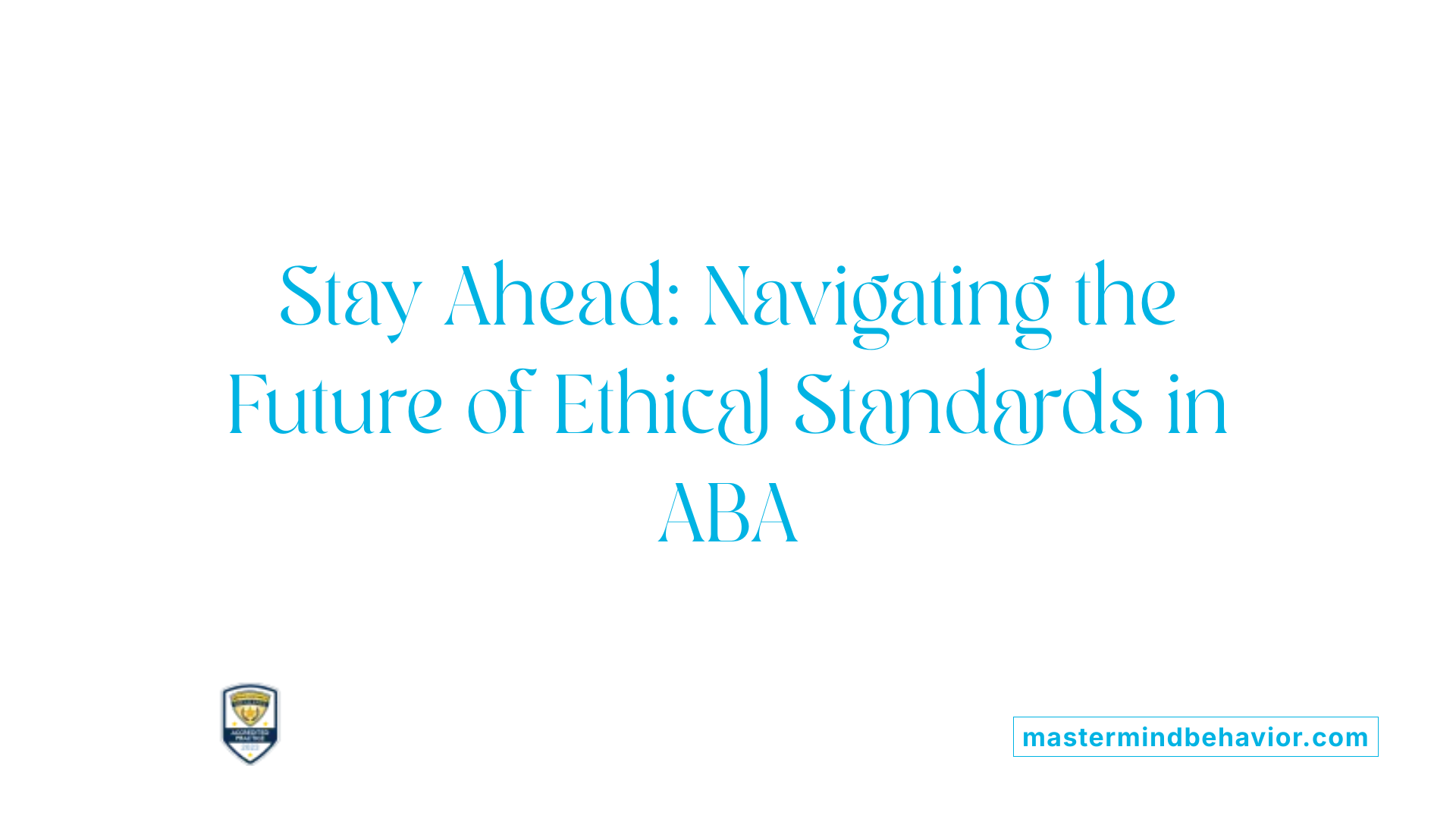 As applied behavior analysis (ABA) continues to advance, ethical standards are also evolving to address new challenges and opportunities. One significant trend is the responsibility of practitioners to adapt to societal changes, technological innovations, and ongoing research developments. Technologies such as artificial intelligence, virtual reality, and telehealth are becoming part of treatment options, and their ethical integration requires careful oversight to prevent misuse or over-reliance.
As applied behavior analysis (ABA) continues to advance, ethical standards are also evolving to address new challenges and opportunities. One significant trend is the responsibility of practitioners to adapt to societal changes, technological innovations, and ongoing research developments. Technologies such as artificial intelligence, virtual reality, and telehealth are becoming part of treatment options, and their ethical integration requires careful oversight to prevent misuse or over-reliance.
Moreover, there is a growing focus on including diverse cultural perspectives and involving stakeholders in treatment planning. Culturally responsive practices ensure interventions respect client backgrounds, values, and social contexts. Stakeholder engagement—especially involving families and clients—enhances social validity, promotes transparency, and supports client autonomy.
To keep pace with these changes, ongoing ethics training and accountability measures are essential. Professionals are encouraged to participate in continuous professional development, including understanding emerging ethical issues related to new technologies and diverse populations.
Current and future trends in ABA ethics emphasize integrating emerging tools responsibly, promoting cultural competence, engaging stakeholders actively, and maintaining transparent, evidence-based practices. These trends reflect a shift toward more personalized, ethical, and accountable care—aimed at safeguarding client rights and optimizing treatment outcomes.
Connecting Ethics to Practice and Regulation
The practice of applied behavior analysis (ABA) is deeply rooted in ethical standards established by professional organizations such as the Behavior Analyst Certification Board (BACB) and the Qualified Applied Behavior Analysis Credentialing Board (QABA). These bodies provide comprehensive guidelines that promote responsible, respectful, and effective service delivery. The BACB’s Ethics Code, for example, emphasizes core principles like beneficence, respect for client autonomy, integrity, and maintaining competence. It offers detailed responsibilities for behavior analysts, including safeguarding confidentiality, obtaining informed consent, and avoiding conflicts of interest.
Ongoing education and supervision are vital for upholding these ethical standards. ABA practitioners are expected to participate in continuous professional development, stay current with research, and adhere to supervisor guidance. Regular supervision sessions help ensure that ethical principles are integrated into daily practice, promoting client welfare and professional growth.
Enforcement measures play a significant role in maintaining ethical practice. The BACB enforces its standards through disciplinary procedures, which may include warnings, suspensions, or revocations of certification for violations. These sanctions serve to protect clients, uphold the discipline’s credibility, and encourage practitioners to reflect on ethical responsibilities.
Practitioners must also engage in systematic ethical decision-making, which involves critical reflection, consultation, and alignment with established guidelines. When dilemmas arise—such as dual relationships or conflicts of interest—behavior analysts are trained to evaluate the situation carefully, considering the potential impact on clients and stakeholders.
In summary, the integration of professional codes, ongoing education, supervision, and strict enforcement safeguards ethical standards in ABA. These measures ensure that services are delivered responsibly, respecting individuals’ rights and fostering trust in the profession.
The Importance of Cultural Competence and Client-Centered Care
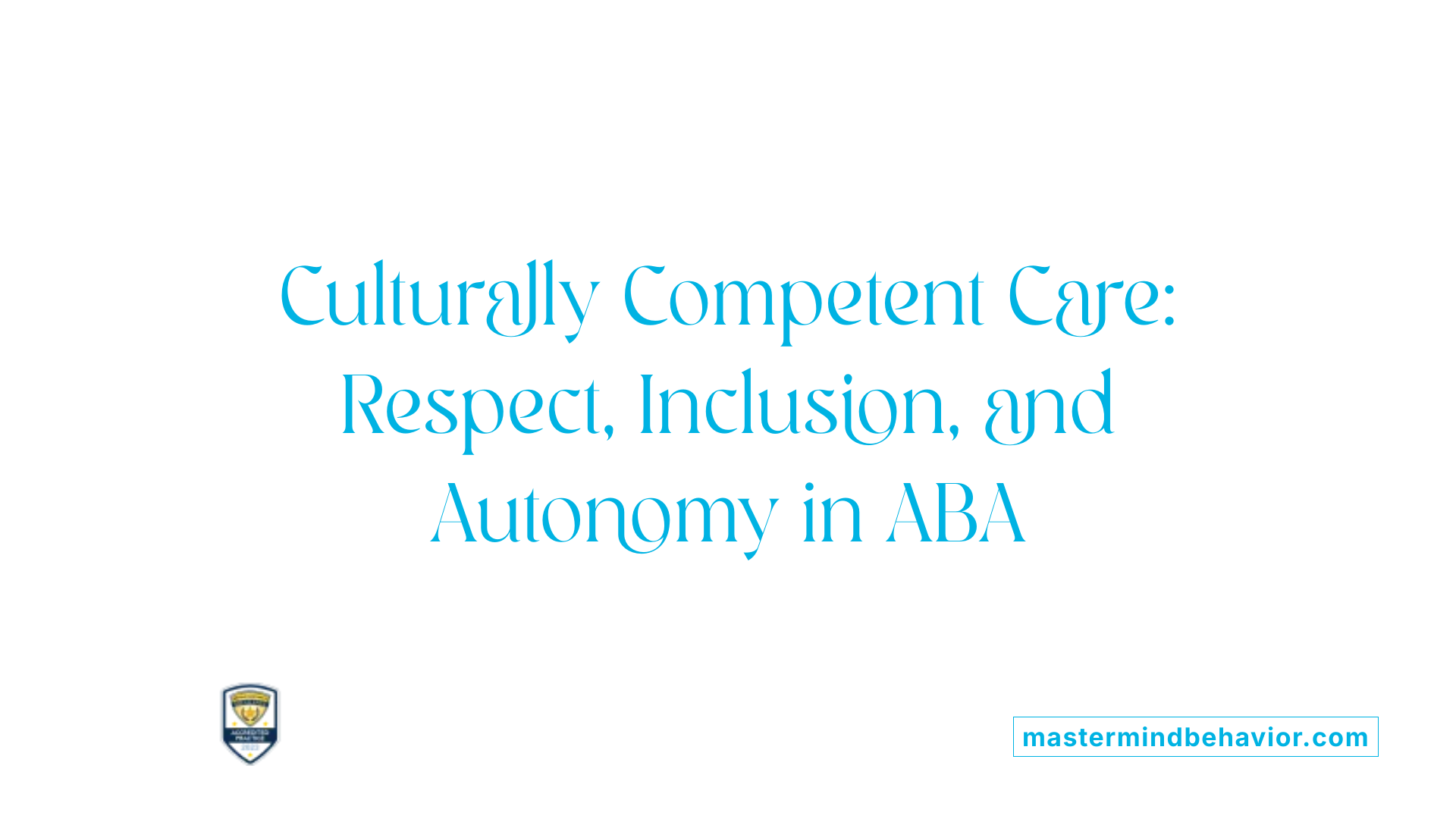
What are ethical considerations related to interventions for autism?
In ethical ABA practice, respecting the dignity and autonomy of autistic individuals is paramount. Interventions should focus on supporting communication, self-advocacy, and self-determination rather than seeking to normalize behaviors or suppress innate traits like stimming or strong interests.
It is essential to recognize the diversity within the autism community, including intersections with race, gender, and other identities. Addressing systemic inequalities—such as disparities in diagnosis and access to quality care—is crucial to ensure fairness and justice.
Ethical practice involves providing culturally competent, accessible, and affirming mental health services. Autistic self-diagnosis and identities should be respected, highlighting the importance of a person-centered approach.
Furthermore, ongoing ethical reflection requires practitioners to consider potential harm from interventions, systemic injustices, and the societal need for environments that embrace neurodiversity.
By prioritizing these ethical considerations, ABA practitioners can foster respectful, inclusive, and equitable care that aligns with the core values of human dignity and social justice, ensuring effective and ethical treatment for individuals with autism.
Critical Evaluation and Moving Forward
The practice of ABA must undergo ongoing ethical review to ensure it aligns with evolving societal values and the rights of clients. While ABA has helped many individuals, especially those with ASD, there are ethical concerns that warrant attention.
Some current practices risk infringing on client autonomy or causing emotional distress. There is also a need to respect neurodiversity by avoiding treatments that aim solely for normalization rather than improving quality of life.
Incorporating new research, societal insights, and direct feedback from clients and their families is critical. This helps practitioners adapt interventions to be more culturally responsive and ethically sound.
Balancing evidence-based interventions with respect for individual rights and cultural context ensures that treatment does not become a one-size-fits-all approach. Clinicians should prioritize informed consent, assent, and make efforts to actively involve clients and families in decision-making.
To advance ethical ABA practice, ongoing dialogue, empirical assessment of procedures, and robust ethical standards are necessary. Regular ethics training, supervision, and self-reflection can support practitioners in making ethically responsible choices.
Ultimately, ethical ABA should promote dignity, autonomy, and social validity, ensuring that interventions serve the whole person and respect their cultural and individual uniqueness.
Fostering Ethical Excellence in ABA
The responsible practice of ABA demands a steadfast commitment to ethical principles, ongoing education, and cultural competence. Practitioners must navigate complex dilemmas with transparency, respect, and a focus on client rights. As societal values and technologies evolve, so too must the standards and reflective practices that underpin behavior analysis. By aligning evidence-based practices with ethical standards, ABA professionals can uphold integrity, promote social justice, and ensure that their services honor the dignity and autonomy of all individuals, especially those with autism.
References
- Ethical Behavior Analysis: Evidence-Based Practice as a Framework ...
- Ethical Concerns with Applied Behavior Analysis for Autism ...
- Ethical Considerations in Applied Behavior Analysis (ABA)
- Ethics for Behavior Analysts
- 7 Ethical Quandaries Faced by Applied Behavior Analysts
- Understanding Ethics in Applied Behavior Analysis: Practical Applicati
- RBT Ethics: A Guide to Ethical Standards | True Progree Therapy
- The Controversy Around ABA - Child Mind Institute
- Ethical Concerns with Applied Behavior Analysis for Autism ...








